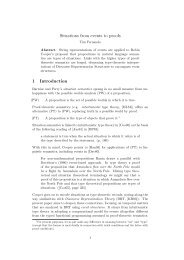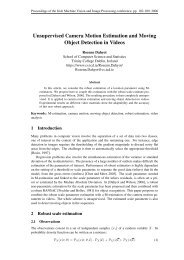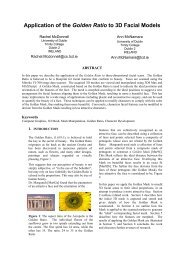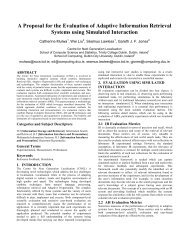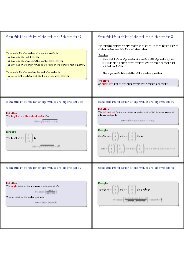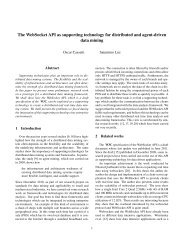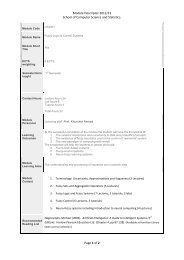- Page 1 and 2: SENTIMENT ANALYSIS BASED ON APPRAIS
- Page 3 and 4: ACKNOWLEDGMENT I am thankful to God
- Page 5 and 6: CHAPTER Page 4. THEORETICAL FRAMEWO
- Page 7 and 8: APPENDIX Page B.5. Evaluator . . .
- Page 9 and 10: Table Page 10.14 Performance with t
- Page 11 and 12: Figure Page 8.1 “The Matrix is a
- Page 13 and 14: ABSTRACT Much of the past work in s
- Page 15 and 16: 2 sentiment is to understand where
- Page 17 and 18: 4 tasks, it is necessary to use str
- Page 19 and 20: 6 1.2 Structured Opinion Extraction
- Page 21 and 22: 8 for example. (2) There are a few
- Page 23 and 24: 10 evaluated in ways that are suite
- Page 25 and 26: 12 appraisal expressions accurately
- Page 27 and 28: 14 annotated corpus of opinionated
- Page 29 and 30: 16 H7: Restricting linkage specific
- Page 31 and 32: 18 as rows and columns as sentiment
- Page 33 and 34: 20 2.3 Review Classification One of
- Page 35 and 36: 22 use perceptron-based</st
- Page 37 and 38: 24 reconciling the differences in t
- Page 39 and 40: 26 that describe them. Indeed, when
- Page 41 and 42: 28 achieve 0.642 precision and 0.69
- Page 43 and 44: 30 word). CFACTS breaks each docume
- Page 45: 32 sets contained seven representat
- Page 49 and 50: 36 using the top-level attitude typ
- Page 51 and 52: 38 Indexing [42], but rather than u
- Page 53 and 54: 40 Core Evaluative Parameters Compr
- Page 55 and 56: 42 of evoked appraisal [20, 104, 10
- Page 57 and 58: 44 has been marked for the transfor
- Page 59 and 60: 46 appear in the COBUILD dictionary
- Page 61 and 62: 48 where the head word is located i
- Page 63 and 64: 50 which pattern to use to parse a
- Page 65 and 66: 52 analysis to link the semantic in
- Page 67 and 68: 54 Direct Object: Person] or [Subje
- Page 69 and 70: 56 derstanding the specific textual
- Page 71 and 72: 58 word’s attribute values from t
- Page 73 and 74: 60 The Darmstadt Service Review Cor
- Page 75 and 76: 62 easiest nsubj aux prep prep flig
- Page 77 and 78: 64 not obviously negative to someon
- Page 79 and 80: 66 categories that identify their l
- Page 81 and 82: 68 The last major type of attitude
- Page 83 and 84: 70 Figure 4.3. The Engagement syste
- Page 85 and 86: 72 general concept of each componen
- Page 87 and 88: 74 people’s opinions, disagreemen
- Page 89 and 90: 76 belongs to the left side of the
- Page 91 and 92: 78 CHAPTER 5 EVALUATION RESOURCES T
- Page 93 and 94: 80 Sentiment Agree
- Page 95 and 96: 82 (which corresponds more-or-less
- Page 97 and 98:
84 or sentiment, and whether they a
- Page 99 and 100:
86 Tagged features router[+2] setup
- Page 101 and 102:
88 Tagged features product[+2][p] r
- Page 103 and 104:
90 “I made this mistake” in exa
- Page 105 and 106:
92 people, and if you join an Epini
- Page 107 and 108:
94 of 180 camera reviews and 462 ca
- Page 109 and 110:
96 • attitude Smoked target taill
- Page 111 and 112:
98 earlier sentence. Though it is p
- Page 113 and 114:
100 have narrative content, and at
- Page 115 and 116:
102 quickly. While training this an
- Page 117 and 118:
104 her last breath. It appears to
- Page 119 and 120:
106 CHAPTER 6 LEXICON-BASED ATTITUD
- Page 121 and 122:
108 of the extra choices to be made
- Page 123 and 124:
110 Attitude Type Appreciation Comp
- Page 125 and 126:
112 attributes. An adjectival appra
- Page 127 and 128:
114 Table 6.1. Manually and Automat
- Page 129 and 130:
116 word can only appear once in th
- Page 131 and 132:
118 ⎡ ⎢ ⎣ Attitude: affect Or
- Page 133 and 134:
120 NER BIO models, this is useful
- Page 135 and 136:
122 • For each token at position
- Page 137 and 138:
124 CHAPTER 7 THE LINKAGE EXTRACTOR
- Page 139 and 140:
126 targets. One common way to indi
- Page 141 and 142:
128 7.2 Linkage Specifications FLAG
- Page 143 and 144:
130 The second part of the linkage
- Page 145 and 146:
132 later. When an attitude group m
- Page 147 and 148:
134 In the third phase (line 8), th
- Page 149 and 150:
136 attitude: type=appreciation The
- Page 151 and 152:
138 Priority 1 2 3 Appraisal Expres
- Page 153 and 154:
140 that the text of these slots co
- Page 155 and 156:
142 Algorithm 8.1 Algorithm for top
- Page 157 and 158:
144 particular word in position onl
- Page 159 and 160:
146 First linkage specifications 1
- Page 161 and 162:
148 a hash map or an array for fast
- Page 163 and 164:
150 documents about a single topic,
- Page 165 and 166:
152 8.6 Heuristically Generating Ca
- Page 167 and 168:
154 • attitude, target, process,
- Page 169 and 170:
156 In the first step of the compar
- Page 171 and 172:
158 Algorithm 8.3 Covering algorith
- Page 173 and 174:
160 Second, it is possible for seve
- Page 175 and 176:
162 143, 188]. Although FLAG does n
- Page 177 and 178:
164 are out of order. This turns ou
- Page 179 and 180:
166 • The preposition connecting
- Page 181 and 182:
168 CHAPTER 10 EVALUATION OF PERFOR
- Page 183 and 184:
170 of linkage specifications are u
- Page 185 and 186:
172 extracted by FLAG that had ambi
- Page 187 and 188:
174 as they would be after linking,
- Page 189 and 190:
176 Table 10.4. Accuracy of Differe
- Page 191 and 192:
178 expressions in a few sentences
- Page 193 and 194:
180 (these are discussed in Section
- Page 195 and 196:
182 Table 10.5. Performance of Diff
- Page 197 and 198:
184 It is worth investigating wheth
- Page 199 and 200:
186 10.5 The Document Emphasizing P
- Page 201 and 202:
188 Table 10.10. The Effect of Atti
- Page 203 and 204:
190 Table 10.13. Performance with t
- Page 205 and 206:
192 Table 10.16. Performance with t
- Page 207 and 208:
194 Table 10.18. End-to-end Extract
- Page 209 and 210:
196 sion extraction, and more resea
- Page 211 and 212:
198 for FLAG on each of the testing
- Page 213 and 214:
200 0.42 0.4 0.38 0.36 0.34 0.32 0.
- Page 215 and 216:
202 majority vote of the different
- Page 217 and 218:
204 CHAPTER 11 CONCLUSION 11.1 Appr
- Page 219 and 220:
206 In the IIT sentiment corpus, co
- Page 221 and 222:
208 The definition of appraisal exp
- Page 223 and 224:
210 intended to be a first step in
- Page 225 and 226:
212 APPENDIX A READING A SYSTEM DIA
- Page 227 and 228:
214 describing the choice to be mad
- Page 229 and 230:
216 A.4 Realizations The realizatio
- Page 231 and 232:
218 B.1 Introduction We are creatin
- Page 233 and 234:
220 tensifier such as “more”. I
- Page 235 and 236:
222 as though the polarity word has
- Page 237 and 238:
224 R. R. White, and examples of wo
- Page 239 and 240:
226 Inscribed appraisal uses explic
- Page 241 and 242:
228 (95) So, if you have a attitude
- Page 243 and 244:
230 • “ comparator more attitud
- Page 245 and 246:
232 If there is a comparator in the
- Page 247 and 248:
234 the target-antecedent. The targ
- Page 249 and 250:
236 In example 122, we are faced wi
- Page 251 and 252:
238 as in example 131. A common sig
- Page 253 and 254:
240 (138) target Zack would be eval
- Page 255 and 256:
242 In example 143, the evaluator,
- Page 257 and 258:
244 In example 151, the possessive
- Page 259 and 260:
246 (161) target Today was an attit
- Page 261 and 262:
248 Table B.1. How to tag multiple
- Page 263 and 264:
250 BIBLIOGRAPHY [1] Akkaya, C., Wi
- Page 265 and 266:
252 [26] Bloom, K. and Argamon, S.
- Page 267 and 268:
254 [50] Etzioni, O., Banko, M., an
- Page 269 and 270:
256 [74] Izard, C. E. (1971). The F
- Page 271 and 272:
258 [98] Lexalytics Inc. (2011). So
- Page 273 and 274:
260 [124] Mullen, A. and Collier, N
- Page 275 and 276:
262 [148] Seki, Y., Ku, L.-W., Sun,
- Page 277 and 278:
264 [173] Whitelaw, C., Garg, N., a



